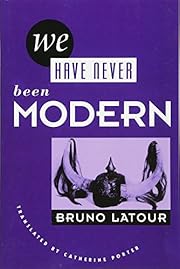

Click on a thumbnail to go to Google Books.
|
Loading... We Have Never Been Modern (1991)by Bruno Latour
 culture (27) No current Talk conversations about this book.  I have no problem conceding that this rather thin book went a bit over my head. The blurb promised a spectacular new insight into human reality and history. And the bold claim that we only seemingly joined modernism stimulated my curiosity. But Latour writes as if he's in his own universe, uses quite particular jargon (which he hardly explains) and terminology that differs from what the rest of the intellectual world ordinarily uses (eg he uses the word 'society' for something that almost everyone else would describe as 'culture') and many passages just remained too obscure for me. And yet: what I did understand, did resonate somehow. I'll try to translate it into my own words: what we understand as modernity (the Enlightened, rational-scientific view of the world) is not a radical break with the foregoing, and it must certainly not be interpreted in terms of progress; on the contrary, it is even a downright wrong view. That is because modernity rests on a radical break between nature (matter) and culture (society), whilst - according to Latour - both belong to the same realm and can't be divided; the break even is clear nonsense. As a consequence, self-proclaimed modernism gives us the illusion that everything we create is new and different and above all better (an accumulation of knowledge and insights). And thus it throws us into an arrogance that dazzles and disguises that we are actually heading for a catastrophe. (Obviously Latour in his later works makes very strong ecological accents). I think I do see what Latour means, and maybe he is partially right (but in a much more nuanced way): western modernism claims a universalism and a truthfulness that isn't realistic; in the past months my reading of a lot of books on systems thinking has made that clear to me, too. And Latour's critique on how we look at history and time from our modernist and progressive perspective really appealed to me; these passages in the book contain fundamentally valuable insights. But I'm not convinced modernism in general makes such a clear break between nature and culture as Latour claims. And the author uses his point of departure to radically deal with everything and everyone (all -isms are done with, and most of all postmodernism, while his view in fact amounts to pure deconstruction and is therefore essentially postmodernist). Moreover, if we follow his claim that the starting point of modernism is a real illusion (that ‘nonsensical’ separation between nature and culture), how then is it possible that we are heading for an (ecological, nuclear ...) catastrophe? Then that distinction does make a difference! It seems to me that Latour got trapped in a thought paradox that he himself constructed. No, I’d rather prefer the much more constructive approach of systems thinking that in its own way tackles the simplistic aspects of modernism, but at least makes an attempt to formulate meaningful alternatives. But then again, maybe I'm wronging Latour and I just misunderstood him. And it seems to me, that that is at least as much his fault as it is mine. no reviews | add a review
Notable Lists
With the rise of science, we moderns believe, the world changed irrevocably, separating us forever from our primitive, premodern ancestors. But if we were to let go of this fond conviction, Bruno Latour asks, what would the world look like? His book, an anthropology of science, shows us how much of modernity is actually a matter of faith. What does it mean to be modern? What difference does the scientific method make? The difference, Latour explains, is in our careful distinctions between nature and society, between human and thing, distinctions that our benighted ancestors, in their world of alchemy, astrology, and phrenology, never made. But alongside this purifying practice that defines modernity, there exists another seemingly contrary one: the construction of systems that mix politics, science, technology, and nature. The ozone debate is such a hybrid, in Latour's analysis, as are global warming, deforestation, even the idea of black holes. As these hybrids proliferate, the prospect of keeping nature and culture in their separate mental chambers becomes overwhelming--and rather than try, Latour suggests, we should rethink our distinctions, rethink the definition and constitution of modernity itself. His book offers a new explanation of science that finally recognizes the connections between nature and culture--and so, between our culture and others, past and present. Nothing short of a reworking of our mental landscape. We Have Never Been Modern blurs the boundaries among science, the humanities, and the social sciences to enhance understanding on all sides. A summation of the work of one of the most influential and provocative interpreters of science, it aims at saving what is good and valuable in modernity and replacing the rest with a broader, fairer, and finer sense of possibility. No library descriptions found. |
Current DiscussionsNonePopular covers
 Google Books — Loading... Google Books — Loading...GenresMelvil Decimal System (DDC)303.483Social sciences Social Sciences; Sociology and anthropology Social Processes Social change Causes of change Development of science and technologyLC ClassificationRatingAverage: (3.85) (3.85)
Is this you?Become a LibraryThing Author. |
||||||||||||||||||||||||||||||||||||||||||||||||||||||||||||||||||||||||||||||||||||||||||||||||||||||||||||||||||||||||